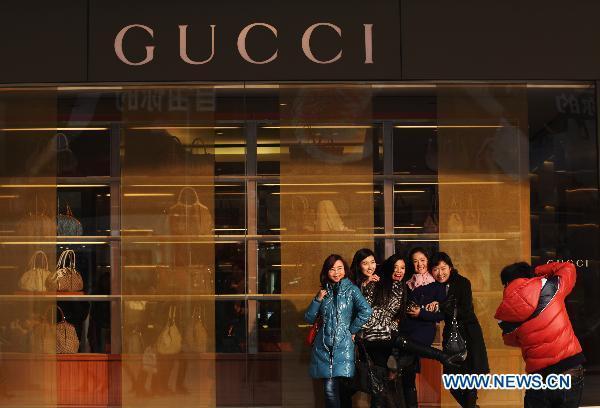Sales slipping for luxury brand stores in China
- By Wu Jin
 0 Comment(s)
0 Comment(s) Print
Print E-mail China.org.cn, January 25, 2016
E-mail China.org.cn, January 25, 2016
|
|
|
Girls pose for photos outside a Gucci store at Intime Lotte Department Store in Beijing, capital of China, Feb. 23, 2011. [Xinhua] |
Gucci recently closed one of its luxury stores in downtown Chengdu, capital of Sichuan Province.
The fashion magnate explained the close as a move to revamp and readjust the arrangement of their flagship stores, the National Business Daily reported after a phone interview with Gucci.
"It is regular for Gucci to launch projects, including opening, revamping, relocating, closing and readjusting stores to improve arrangements in consideration of retail sales," said an anonymous staff member inside the company.
"Moreover, with a new chief design inspector assuming office, this new concept will be implemented in China from the start of 2016."
Opened in 2011, the 800-sqare-meter flagship store of Gucci at the Renhe Spring Department Store was the landmark that signaled the brand's first luxury shopping center in southwest China.
However, consumers moved to other Gucci stores that were later established in Chengdu, leaving the first one open for discounted goods only.
The inventory of the Renhe Store was cleared out and the shop assistants were sacked or transferred to other stores, said a sales clerk from another of Gucci's concept stores at the Taiguli Outlet in Chengdu.
According to a Bain Report, a consulting company headquartered in Boston, luxury stores have closed one after another in China as the sales of those stores continue to slide.
The sales of luxury goods declined one percent year on year to 113 billion yuan (US$17.2 billion) in 2015. As a result, Gucci closed five stores and only opened a single new one in China.
According to the Kering Group, Gucci's parent company, the global revenue of Gucci in the third quarter last year grew 8.6 percent to 924 million euros. However, sales in the Asia Pacific Region plummeted 17 percent as the sluggish market in China can hardly be overlooked.
"The upward trend of luxury consumption started to reverse as early as in 2012," said Zhao Ping, a researcher from the China Council for the Promotion of International Trade.
Zhao said stringent discipline introduced to encourage the banning of three squandering consumption patterns, consisting of overseas travel, receptions and official cars, on public funds has had a huge impact on the sales of luxury goods.
Moreover, the "chic trend" emerging in China continues to attract younger, less affluent people towards less expensive luxury goods.
However, the most significant factor causing the slipping sales of luxury goods should be attributed to the price gap of the goods between both domestic and foreign markets.
With a 20 to 30 percent price gap, the physical stores are vulnerable to competition from cross-border online businesses, Zhao said.







Go to Forum >>0 Comment(s)